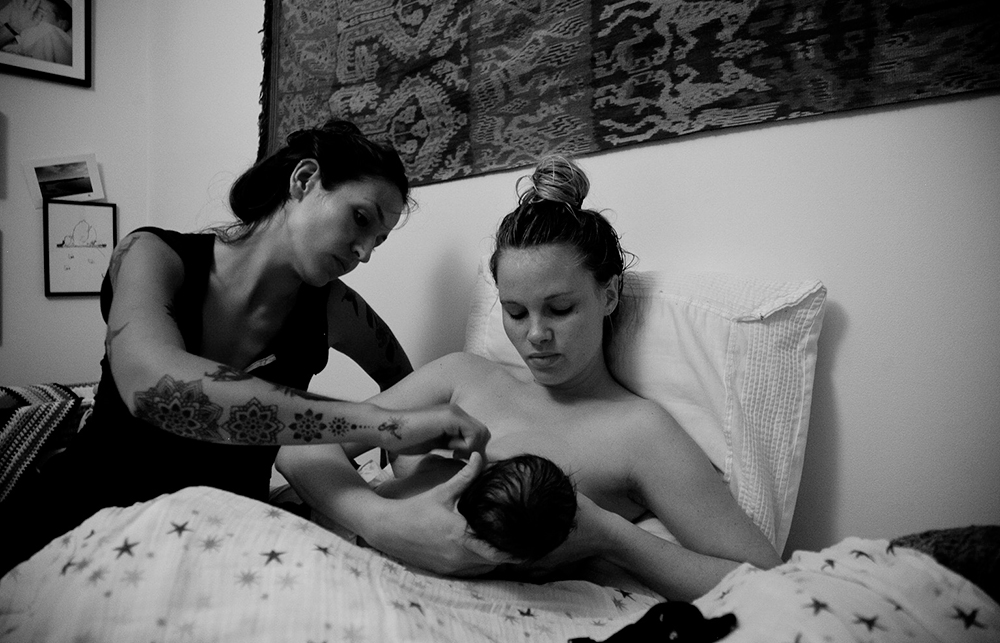
紐約由于受冠狀病毒蔓延影響,當地醫院采取了極端措施,限制訪客進入,避免傳播病毒。一些醫院限制訪客進入產房,哪怕是產婦的伴侶也不行。
紐約州州長安德魯?庫默周末對此做出干預,要求醫院允許無癥狀的伴侶在產婦分娩時在場。但庫默保留了另一項禁令:禁止導樂師等陪產的工作人員在場。
一些產婦會聘請導樂師陪產,她們是在分娩過程中提供指引和病人權益服務的非醫療專業人員。
“我們這個行業正在努力應對,”多米諾?柯克說,她是布魯克林提供導樂師服務和培訓項目的Carriage House Birth的聯合創始人。
Carriage House Birth有約100名導樂師,她們的工作本質上是體力勞動。該組織的導樂師會和孕婦一起為可能的分娩場景做準備,在分娩過程中為她們提供權益服務,并在產后的“懷孕第四階段”幫助她們解決母乳喂養或產后抑郁的問題。導樂師的收費標準從志愿服務到4000美元不等。11年前,柯克在兒子出生6個月后,成為了一名導樂師。
盡管有禁令,但許多孕婦認為導樂師的存在必不可少。這項工作也很難通過線上完成,已經為導樂師服務付過費的孕婦都很清楚這個現實。“有一種被遺棄和失落的感覺。”柯克說,“客戶的情緒波動也很大。他們已經付過費了,或者本打算聘請導樂師,但卻無法得到相應的服務。”
雖然導樂師不能陪客戶去醫院,導致她們無法正常開展工作,但柯克說,由于這場危機的嚴重程度顯而易見,她和其他業內人士都預料到了會有這些限制令——“我們要宅在家里”——而她在是否解除這些限制的問題上也左右為難。“我們的工作是保護新生兒……這是一個數字游戲。房間里的人越多,房間里的人被感染的可能性就越大。”她說。
預產期臨近的孕婦不得不應對不斷改變的限制令,還要為大流行病對醫院環境產生的影響憂心忡忡,導樂師組織正在做出調整。布魯克林為有色人種和低收入女性提供服務的古歌導樂服務公司正在向有興趣在導樂師無法在場的情況下為產婦提供病人權益服務的護士和專業醫療人士提供線上導樂培訓。該組織創始人香奈兒?波奇亞?阿爾伯特指出,對有色人種而言,導樂師作為病人權益服務提供者的角色加倍重要,因為這些產婦出現并發癥或死亡的風險更高。她指出:“存在因恐懼導致的脅迫和因為拒絕護理產生報復的風險。”各機構的導樂師都在和孕婦進行產前線上預約,并在臨產時通過FaceTime連線。
以前家庭助產士一個月一般只接三到五個客戶,現在因為有大量孕婦想要徹底改變分娩計劃,她們需要應對詢問量激增的現狀。紐約的家庭助產士金姆?孫說,她現在一天接到的電話數已經超過了她往常每年接待的病人數量。她呼吁導樂師去做她們最擅長的事情:倡議。“她們可以站出來,確保衛生部、州政府和市政府盡量把相應的設備送到醫院。如果她們這樣做了,政府就很有可能不會采取[隔離女性]的政策,”孫說。
柯克自己也有六個月的身孕。她希望等到自己分娩的時候,紐約已經度過了疫情高峰,醫院的規定能夠更加寬松。“我一直在笑我自己,”她說,“也許我當了11年的導樂師,為的是有一天我能成為自己最好的導樂師。”(財富中文網)
譯者:Agatha
紐約由于受冠狀病毒蔓延影響,當地醫院采取了極端措施,限制訪客進入,避免傳播病毒。一些醫院限制訪客進入產房,哪怕是產婦的伴侶也不行。
紐約州州長安德魯?庫默周末對此做出干預,要求醫院允許無癥狀的伴侶在產婦分娩時在場。但庫默保留了另一項禁令:禁止導樂師等陪產的工作人員在場。
一些產婦會聘請導樂師陪產,她們是在分娩過程中提供指引和病人權益服務的非醫療專業人員。
“我們這個行業正在努力應對,”多米諾?柯克說,她是布魯克林提供導樂師服務和培訓項目的Carriage House Birth的聯合創始人。
Carriage House Birth有約100名導樂師,她們的工作本質上是體力勞動。該組織的導樂師會和孕婦一起為可能的分娩場景做準備,在分娩過程中為她們提供權益服務,并在產后的“懷孕第四階段”幫助她們解決母乳喂養或產后抑郁的問題。導樂師的收費標準從志愿服務到4000美元不等。11年前,柯克在兒子出生6個月后,成為了一名導樂師。
盡管有禁令,但許多孕婦認為導樂師的存在必不可少。這項工作也很難通過線上完成,已經為導樂師服務付過費的孕婦都很清楚這個現實。“有一種被遺棄和失落的感覺。”柯克說,“客戶的情緒波動也很大。他們已經付過費了,或者本打算聘請導樂師,但卻無法得到相應的服務。”
雖然導樂師不能陪客戶去醫院,導致她們無法正常開展工作,但柯克說,由于這場危機的嚴重程度顯而易見,她和其他業內人士都預料到了會有這些限制令——“我們要宅在家里”——而她在是否解除這些限制的問題上也左右為難。“我們的工作是保護新生兒……這是一個數字游戲。房間里的人越多,房間里的人被感染的可能性就越大。”她說。
預產期臨近的孕婦不得不應對不斷改變的限制令,還要為大流行病對醫院環境產生的影響憂心忡忡,導樂師組織正在做出調整。布魯克林為有色人種和低收入女性提供服務的古歌導樂服務公司正在向有興趣在導樂師無法在場的情況下為產婦提供病人權益服務的護士和專業醫療人士提供線上導樂培訓。該組織創始人香奈兒?波奇亞?阿爾伯特指出,對有色人種而言,導樂師作為病人權益服務提供者的角色加倍重要,因為這些產婦出現并發癥或死亡的風險更高。她指出:“存在因恐懼導致的脅迫和因為拒絕護理產生報復的風險。”各機構的導樂師都在和孕婦進行產前線上預約,并在臨產時通過FaceTime連線。
以前家庭助產士一個月一般只接三到五個客戶,現在因為有大量孕婦想要徹底改變分娩計劃,她們需要應對詢問量激增的現狀。紐約的家庭助產士金姆?孫說,她現在一天接到的電話數已經超過了她往常每年接待的病人數量。她呼吁導樂師去做她們最擅長的事情:倡議。“她們可以站出來,確保衛生部、州政府和市政府盡量把相應的設備送到醫院。如果她們這樣做了,政府就很有可能不會采取[隔離女性]的政策,”孫說。
柯克自己也有六個月的身孕。她希望等到自己分娩的時候,紐約已經度過了疫情高峰,醫院的規定能夠更加寬松。“我一直在笑我自己,”她說,“也許我當了11年的導樂師,為的是有一天我能成為自己最好的導樂師。”(財富中文網)
譯者:Agatha
As the coronavirus spread throughout New York, hospitals took the extreme action of limiting visitors who could transmit the virus. Several placed limits on visitors to delivery rooms, including the partners of women in labor.
New York Gov. Andrew Cuomo stepped in this weekend, forcing hospitals to allow non-symptomatic partners to be present during delivery. But Cuomo left in place another ban: one on birth workers like doulas, the nonmedical professionals some women hire to act as guides and advocates through the birth process.
“We’re really grappling with it as a profession,” says Domino Kirke, cofounder of the Brooklyn-based doula collective and training program Carriage House Birth.
Carriage House Birth includes about 100 doulas, whose work is by nature physical. On a sliding scale of fees from volunteer up to $4,000, the collective’s doulas spend time with pregnant women preparing for possible birth scenarios, advocate for them during labor, and help with breastfeeding or postpartum depression in the “fourth trimester” after birth. Kirke became a doula 11 years ago, six months after the birth of her own son.
Despite the ban, it’s work that many pregnant women consider essential. And it’s also a profession that doesn’t easily translate to the virtual realm, a reality that women who have already paid for doula services are well aware of. “There’s a feeling of abandonment and loss,” Kirke says. “We’re letting people go through the roller coaster of emotions, that they won’t have the team they paid for or envisioned.”
While doulas’ inability to accompany their clients to the hospital compromises their ability to do their job, Kirke says she and others in the profession expected the restrictions as the extent of the crisis became clear—“we were hunkering down”—and she’s torn about lifting them. “As someone trying to protect newborns…it’s a numbers game. The more bodies in the room, the greater likelihood someone could walk out of there infected,” she says.
As women nearing their due dates contend with these ever-changing restrictions and worries about the pandemic’s effects on hospitals, doula organizations are adapting. Brooklyn’s Ancient Song Doula Services, which serves women of color and low-income women, is offering virtual doula training to nurses and health care professionals interested in filling the advocate role while doulas are unable to be present during births. Founder Chanel Porchia-Albert notes that the patient advocacy role played by doulas is doubly essential for women of color, who face a greater risk of complications or death. “There’s the risk of fear-based coercion, reprisal for refusal of care,” she notes. Doulas across organizations are doing virtual prenatal appointments and appearing on FaceTime during labor.
Home-birth midwives—who typically take only three to five clients a month—are dealing with an influx of inquiries from women looking to radically alter their birth plans. Kimm Sun, a New York home-birth midwife who says that the number of calls she’s gotten in a single day has now exceeded the number of patients she typically takes per year, urges doulas to do what they do best: advocate. “They can go out and do the work of making sure the Department of Health and the government and the city are trying to get equipment to the hospitals. If they do that, there’s a big chance they’re not going to have to put in the policy of [isolating women],” Sun says.
Kirke herself is six months pregnant. She’s hoping New York will have passed its peak in the virus crisis by the time she gives birth and that the rules at hospitals will be more relaxed. “I’ve been laughing to myself,” she says. “Maybe I’ve been a doula for 11 years so I can be the best doula to myself.”






